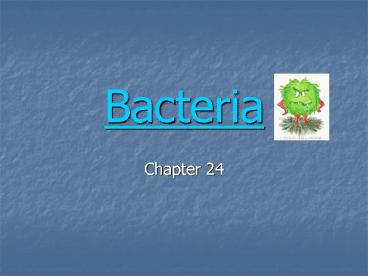Bacteria - PowerPoint PPT Presentation
1 / 19
Title: Bacteria
1
Bacteria
- Chapter 24
2
Archaebacteria
- Prokaryotic single celled
- Probably all life's origin
- Include the extremophiles
3
Extremophiles
- Methanogens produce methane gas, oxygen is
poisonous to them ( swamps, sewage, intestines)
4
Extremophiles
- Halophiles salt loving great salt lake etc.
5
Extremophiles
- Thermoacidophiles extreme high temperatures.
6
EUBACTERIA (Bacteria)
- Come in 3 basic shapes
- Bacilli Coccci Spirilla
7
Bacteria
- Most bacteria are Heterotrophic get their
energy from organic compounds of other organisms. - A few are Autotrophic make their own energy
from photosynthesis.
8
Bacteria Reproduction
- Bacteria divide by Binary Fission not meiosis
(no nucleus). - Bacteria can also exchange genetic material
through conjugation. - Movie
9
BACTERIA
- One important role of bacteria is Nitrogen Fixing
transformation of atmospheric nitrogen (N2)
into other forms of nitrogenous compounds that
can be used by plants.
10
Gram Staining
- Gram Positive purple retain stain this
means that the bacteria have a thick cell wall
and are - Gram Negative pink this means that the
bacteria have a thin cell wall. - Gram Staining can determine
- toxicidity, reaction to antibacterial drugs and
disinfectants.
11
Cyanobacteria
- Blue Green Algae
- Can be a lot of different color.
- Population bloom death (red tides)
12
Genetic Recombination
- Transformation Bacteria takes in DNA from its
external environment - Conjugation bacteria share DNA when they come
in contact - Transduction a virus obtains a piece of DNA
from a Bacteria then spreads the bacteria
13
Diseases caused by Bacteria
- Exotoxin -Toxins that are leaked or secreted out
of the bacteria cell and into its host (you and
me). - Endotoxins are generally much less pathogenic
than Exotoxins and rarely cause death. Many
fevers are caused by endotoxins whereas exotoxins
never produce a fever.
14
Diseases caused by Bacteria copy down 3
- Leprosy (Hansen's Disease)
- Tetanus
- Whooping Cough
- Typhoid Fever
- Paratyphoid Fever
- Cholera
- Plague
- Tuberculosis
- Meningitis
- Bacterial Pneumonia Anthrax
- Botulism
- Bacterial Dysentery
- Diarrhea
- Food Poisoning Gas
- Gangrene
- Syphilis Diphtheria
- Gonorrhea
- Trench Fever
- Trench Fever Influenza
- Typhus Fever
- Lyme Disease
- Tooth Decay S
- carlet Fever
- Tonsillitis Food
- Poisoning Toxic
- Shock Syndrome
- Rocky Mountain Spotted Fever
- Human Monocytic
- Erhlichiosis
- Human granulocytic
- Gasteroenteritis
- Peptic Ulcers
15
STD Bacterial Infections
- Neisseria gonorrhea (causes gonorrhea or
gonococcal infection) - Chlamydia trachomatis (causes Chlamydia
infections) - Treponema pallidum (causes syphilis)
- Haemophilus ducreyi (causes chancroid)
- Klebsiella granulomatis (previously known as
Calymmatobacterium granulomatis causes granuloma
inguinale or donovanosis).
16
Bacteria around me?
- How much bacteria is around us?
- Where are the most infected areas?
- How can you reduce your risk for bacteria?
- Cell phone clip
STAPH
17
Antibiotics and Antibiotic Resistance
- Antibiotics are drugs that combat Bacteria ex
Penicillin. - Antibiotic Resistance-Disease -causing microbes
that have become resistant to drug therapy are an
increasing public health problem. Tuberculosis,
gonorrhea, malaria, and childhood ear infections
are just a few of the diseases that have become
hard to treat with antibiotic drugs.
18
How to reduce resilance.
- Antimicrobial drugs intended for bacterial
infections should not be taken for viral
infections such as colds, coughs, or the flu. - If your health care provider determines that you
do not have a bacterial infection, ask about ways
to help relieve your symptoms. - Do not pressure your provider to prescribe an
antibiotic. - Take medicine exactly as your health care
provider prescribes. - Take the antibiotic until it is gone, even if you
are feeling better. Do not save the medication to
treat yourself or others later.
19
Useful Bacteria write down 2
- Helps make some foods
- Preserve food
- Keep gut healthy
- Break down toxins
- Make soil
- Billions of years ago they increased oxygen by
20 enabling larger items to live

